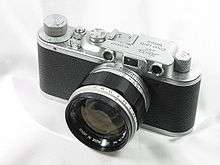Leica copies

Leica copies originate from the Leica camera that was launched by Ernst Leitz, Wetzlar in 1925; it uses the 35mm perforated film. The design was carried out by Oskar Barnack, beginning in 1913 by building a camera for 24×36mm negatives that by now is called the Ur-Leica; but Ernst Leitz did not decide to manufacture it until 1924. Once started, the Leica production volume doubled each year; in 1929, some 16.000 cameras were produced. In 1930, an improved model with interchangeable lens was introduced, followed a year later by the fully developed Leica II with standardized film to lens flange distance, and in 1932 the basic Leica Standard; the Leica concept was established. This camera's features are the basis for defining a Leica copy.[1][2]
After World War II, the Allied countries made all German patents in their country available to the public free of charge. Ernst Leitz had no patents registered in the USSR. Cameras introduced later would not cause patent rights infringements as far as the early Leica models are concerned.[3]
The set of specifications chosen to define a screw mount Leica copy, as described by HPR,[3] is:
- 1 - Predominantly a rangefinder/viewfinder camera type
- 2 - With a 39mm diameter screw lens mount with approximately 1 mm pitch
- 3 - and a 28.8 mm film to lens flange distance
- 4 - Using the 35mm film format
- 5 - And employing a focal-plane shutter

Some 500 individual camera models that were produced by a large number of camera manufacturers since the introduction of the Leica fall into this category. These originate from about 21 original Leica inspired cameras. However, some of these never made it past the prototype stage, and some came on the market only in very small quantities. Those that made it to the market by more than a few thousands were:
(Only the first model by each manufacturer is mentioned, while the indicated period encompasses the entire range of models until the end of production)
- 1934 - 1990: The FED manufactured in the Kharkov labour commune in USSR.[4]
- 1940 - 1961: The Leotax manufactured in Japan by Showa Kogaku, Tokyo.[5]
- 1947 - 1959: The Minolta-35 manufactured by Chiyoda Kogaku, Osaka (24×32mm at first).[6]
- 1947 - 1954: Kardon manufactured by Premier Instrument Corp., New York, USA.[3]
- 1948 - 1959: Nicca manufactured in Japan by Nippon Camera Co. Ltd, Tokyo.[3]
- 1948 - 1977: Zorki manufactured in USSR by KMZ, Krasnogorsk.[4]
- 1951 - 1968: Canon III manufactured in Japan by Seiki Kogaku, Tokyo, but see discussion page.[7]
- 1953 - 1959: Tanack IIC manufactured in Japan by Tanaka Optical Co., Tokyo.[5]
- 1953 - 1961: Periflex manufactured in England by K. G. Corfield Ltd. Wolverhampton.[8]
- 1958 - 1963: Shanghai 58-I manufactured in China by Shanghai Camera Factory.[9]
- 1959 - 1960: Yashica YE manufactured by Yashica as a continuation of the Nicca range.[3]
Note: Some 35mm rangefinder cameras were also partly inspired by the Zeiss Ikon Contax.[10] Among these belong the 1935 Canon and the 1948 Nikon rangefinder camera.[11]
References
- ↑ Brian Long (1997). 35mm Cameras. The Crowood Press, Wiltshire. ISBN 978-1-86126-948-5.
- ↑ Dennis Laney (1992). Leica Collectors Guide. Hove Collectors Books, Hove. ISBN 1-874707-00-6.
- 1 2 3 4 5 HPR (1994). Leica Copies. Classic Collection Publications, London. ISBN 1-874485-05-4.
- 1 2 Jean Loup Princelle (1995). Russian and Soviet Cameras. Hove Foto Books. ISBN 1-874031-02-9.
- 1 2 K. Sugiyama, H. Naoi and J.R. Bullock (1985). The Collectors Guide to Japanese Cameras "The Rosetta Stone..". The Quarter Planning Co., Ltd. Tokyo. ISBN 0-87011-743-2.
- ↑ Scheibel, Anni Rita; Scheibel, Josef (1999). 70 Jahre Minolta Kameratechnik - Von der Nifcalette [sic] bis zur Dynax 9 (in German) (3rd ed.). Stuttgart: Verlag der H. Lindemanns Buchhandlung. ISBN 3-89506-191-3. Retrieved 2012-10-16.
- ↑ Peter Dechert (1989). Canon Rangefinder Cameras *1933-68. Hove Foto Books, Hove. ISBN 0-906447-30-5.
- ↑ John E. Lewis (1985). The Periflex Story. Ericsen Lewis (Publications) Norwich UK. ISBN 0-9510211-0-9.
- ↑ Douglas St Denny (1989). Cameras of the peoples republic of China. Jessop Specialist Publishing. ISBN 0-9514392-0-0.
- ↑ Dr. A. Neill and Ivor Matanle (1980). The Collector's Checklist of Contax and other Zeiss classic miniature cameras, lenses and accessories. Camera Collector Books, Sussex.
- ↑ Robert Rotoloni (1983). Nikon rangefinder camera. Hove Foto Books, Sussex. ISBN 0-906447-25-9.